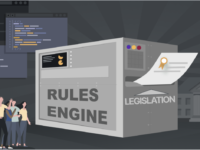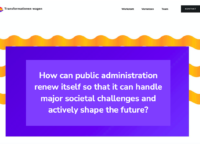The Australian Government - Dept of Finance sponsored a Proof of Concept (PoC) that looked at how Rules as Code (RaC) might be provided as a shared utility that can be used to deliver simpler, personalised digital user journeys for citizens. RaC is the process of taking legislation and regulations and turning them into machine-readable code. It provides many benefits to citizens and government, including greater reuse, less duplication, greater transparency and accessibility of rules.
Innovation Tag: Experimentation
Case Study
Driving Artificial Intelligence in Public Services through accredited upskilling and project…
The Foundation Certificate in AI project seeks to make Ireland a world-leader in the ethical application of Artificial Intelligence across the Irish civil and public services by 2030 and is in line with the digital ambition, which the government of Ireland set itself. The project aims to upskill/reskill Irish Civil & Public Servants, identify a pipeline of potential AI projects that can improve service delivery, deliver value for money and is aligned National Strategy in AI & Innovation.
The solution generates a controlled virtual environment quite similar to real evacuation and emergency situations. It seeks to train "Brigadistas" (first response agents) in change of guiding the evacuation of the people from each building while ensuring the bindingness to the protocol and safety measures in case of emergency. The innovation was trialed in an evacuation mock-up in the Presidency building.
A new Area of Management (AoM) on Innovation has been integrated into the Management Accountability Framework (MAF). This is a tool used to promote management excellence in innovation for Canadians by assessing an organization’s ability to plan, generate and use rigorous evidence to inform decision-making on high-impact innovations. This is innovative in that it provides a clear roadmap to building thriving, innovative organizations and outlines a distinct role for executives in the process.
Customer-oriented public services direct the authorities to look at citizens from their own responsibilities without taking into account a citizen’s overall life situation. A human-centric and life event -based operating model supported with the life-event service ecosystem technology enables the authorities to produce value directly in people's life events through the cooperation of other service providers in a timely and proactive manner.
In 2020, the health department in Queensland Australia piloted a novel form of government-university partnership to multiply the department's capacity for frontline clinical innovation. Building on the significant success of our pilot year, this award winning program has evolved into a dynamic ecosystem of clinicians, consumers and academic experts with an enviable track-record of diverse service transformations. This model is now being emulated by many local health services across the State.
Transformation Wagen - "Daring Transformations" is a learning programme co-developed with and for public servants in the field of Environmental Politics in Germany. Aiming at enhancing tools for public administration to renew itself, it creates capacities and methodologies to handle major societal challenges and foster a transformative mindset to actively shape the future and not just react to what is happening.
Ethical delivers is a home delivery platform founded in 2020 to address the needs raised by the Coronavirus pandemic as an alternative to extractive capitalist platforms. It provides basic goods and services while respecting workers' rights and environmental sustainability. Designed following cooperative principles through an urban codesign process, it has clear pillars: a fair rider salary, the use of vehicles that minimise environmental impact, and a more direct relationship with small…
There are plenty of innovative initiatives that never manage to reach the public sector, generating inequalities in access and quality in the provision of solutions. GovtechLab Madrid is the first open innovation Lab located inside of the Community of Madrid. The focus of the Lab is on reducing the barriers and accompanying both the supply and demand sides in finding solutions and opportunities to implement them.
We can agree on a lot more than we are led to believe. PolicyKeys is firstly a robust one-page narrative tool built around a ground truth so an AI can assist in predicting support for any public policy solution. PolicyKeys is secondarily a role-playing game to help player's better understand their own internal conflicts, as well as better understand their fellow citizen's differing beliefs—the result is a leaderboard of ideas that have deep and wide acceptance—approaching consensus.







